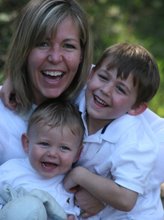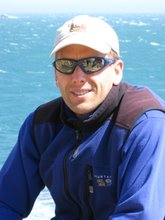Like most people our age, Pete and I knew practically nothing about cancer before I was diagnosed, which is part of the reason that we were so blindsided by the news!! I feel like we have both had a crash course in oncology these past few weeks and so I thought I would share some of the info that we have learned:
> Cancer is a group of more than 100 different diseases. Cancer occurs when cells become abnormal and keep dividing and forming more cells without control or order. Everyone has cancer cells within their body, but most people's immune systems are strong and healthy enough to recognize these cells as abnormal and destroy them before they become a problem.
> All organs of the body are made up of cells. Normally, cells divide to produce more cells only when the body needs them. This orderly process helps keep us healthy. If cells keep dividing when new cells are not needed, a mass of tissue forms. This mass of extra tissue, called a growth or tumor, can be benign or malignant. Benign tumors are not cancer. They can usually be removed and, in most cases, they do not come back. Most important, cells from benign tumors do not spread to other parts of the body. Benign tumors are rarely a threat to life.
> Malignant tumors are cancer. Cancer cells can invade and damage nearby tissues and organs. Also, cancer cells can break away from a malignant tumor and enter the bloodstream or the lymphatic system. This is how cancer spreads from the original (primary) tumor to form new tumors in other parts of the body. The spread of cancer is called metastasis.
> Most cancers are named for the type of cell or the organ in which they begin. When cancer spreads, the new tumor has the same kind of abnormal cells and the same name as the primary tumor. For example, if lung cancer spreads to the liver, the cancer cells in the liver are lung cancer cells. The disease is called metastatic lung cancer, not liver cancer.
> The current understanding of the causes of cancer is incomplete, but it is clear that cancer is not caused by an injury. And although being infected with certain viruses may increase the risk of some types of cancer, cancer is not contagious. No one can "catch" cancer from another person.
> Ninety percent of cancers develop because of complex interactions between our bodies, our lifestyles, our genetic makeup and our environment. Scientists have discovered different factors that cause cancer. Research shows that tobacco is estimated to cause 30 percent of all cancer deaths, poor diet 35 percent, reproductive and sexual behavior 7 percent, work-related causes 4 percent and the environment itself causes 3 percent.
> Scientists believe that genetic changes, whether inherited or acquired, are the basic cause of cancer. Some scientific theories do suggest that cancer may be a hereditary disease because each individual's make-up may make them more susceptible to certain cancers. About 50 of the more than 120 different types of cancer occasionally run in families.
> Most of the current scientific evidence indicates that a normal cell can become transformed into a cancer cell when certain genes become activated. Recent work in cancer biology concerns the study of oncogenes, a specific gene that participates in changing a normal cell into a cancer cell. It is thought that an oncogene might be present in an inactive form in normal cells and is some way activated to create cancer cells.
> The nutritionist that I am working with talks extensively about how the foods that we eat "activate" certain gene responses. Not surprisingly, vegetables and fruits all work to keep our cells healthy and operating correctly, while foods like meats, dairy and fatty foods all negatively affect our cells natural ability to function properly.
> If you want to assess your own cancer risk for a variety of different cancers, check out this site: www.yourdiseaserisk.harvard.edu
Keep in mind, though, that when I completed the questionnaire for colon cancer, my risk profile came back as "well below average." I guess this is why all of my doctors keep pointing to genetics or "bad luck" as the root cause of my cancer.



No comments:
Post a Comment